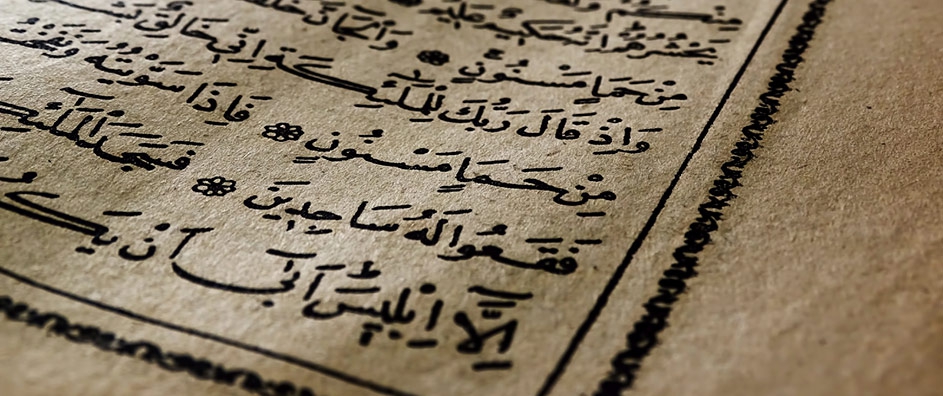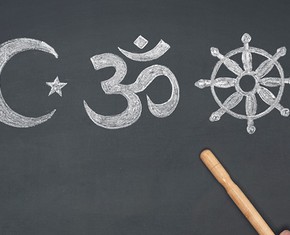The views expressed in our content reflect individual perspectives and do not represent the authoritative views of the Baha'i Faith.
All the prophets of God have come to unite the children of men and not to disperse them; to put in action the law of love and not enmity. – Abdu’l-Baha, Divine Philosophy, p. 25.
In the global East, most people know of and understand Sharia law, the canonical Islamic legal code. In the West, widespread knowledge of Sharia has not yet reached most people; and those it has reached often have a negative opinion of it, primarily because of its association with radical Islamist movements, who tend to apply it harshly and conservatively.
But Sharia law has a long and very illustrious history of bringing order, rights and justice to a previously lawless and barbaric population. In fact, the Arabic word sharia really refers to religious law as a whole. Shari at Musa, for example, is the phrase for Mosaic or Jewish religious law; while shari at al-Masih is Arabic for Christian religious law. When Islam began to spread during the Middle Ages, the emerging Sharia code (sharia literally means “pathway to be followed”) had a significant civilizing influence:
Mohammed through his power was enabled to elevate a nation, for on his teachings a mighty civilization was constructed in the Arabian peninsula, the influence of which, as recorded in history, extended as far west as Spain. Let us be just. When a being, alone, in the midst of a savage tribe begins by teaching them and finally succeeds in raising them to a high degree of civilization, we must admit that he has an extraordinary power. – Abdu’l-Baha, Divine Philosophy, p. 88.
As a result of this proven positive effect, Sharia law developed and spread. It replaced ineffective governments, stopped tribal wars and elevated morality, supplanting formerly corrupt practices and political institutions. Emphasizing unprecedented levels of justice and fairness for the time, Sharia law initially had an enormously beneficial effect on the civilizations and cultures it touched.
For example: do you know where the concept of a “jury of your peers” comes from? It emerged directly from Sharia law, not Western jurisprudence. The Islamic lafif—a twelve-member group of ordinary people, neighbors and peers sworn to tell the truth and give a unanimous verdict in a trial—settled matters of judicial truth long before the concept of a jury found its way into English law.

The term “jury of your peers” comes from the Islamic “lafif”
Even today, various Muslim countries utilize all or part of the Sharia code, including most majority-Muslim Middle Eastern nations like Pakistan, Qatar, Saudi Arabia and many others. Approximately a quarter of the world’s people are now governed by some form of Sharia law—not because Muhammad imposed it on Arabian cultures, but because it proved so workable and effective during the first centuries of its initial implementation:
Likewise at a time when the Arabian tribes were in the utmost enmity and strife, shedding the blood of each other, confiscating property, making families and children captives, waging continuous warfare in the Arabian Peninsula, when no soul was at ease and no tribes had any rest-at such a time His Holiness Muhammad appeared. He united the scattered tribes. He caused them to agree and harmonize with each other. Strife and warfare were banished. The Arabs progressed to such a degree that the kingdom of Andalusia and the great dominion of the Caliphs was established.
From this we can understand that the foundation of divine religion is one and that it is for peace, not for war; it is love, truth, unity, and fellowship. But wars emanated from imitations which later had crept in. The origin of religion is one and that is Reality. … In imitations, differences are found; because imitations differ, therefore they become the cause of discord. If, however, all the religions of the world would forsake imitation and follow the original foundation of religion, all would agree. They would have no more strife and warfare, for religion is reality and reality is one; it does not accept multiplicity. – Abdu’l-Baha, Star of the West, Volume 9, pp. 143-144.
With this quote from the Baha’i teachings, Abdu’l-Baha gives us a clear indication of the Baha’i view of religious law: that its social aspects cannot ever last eternally. Conditions change, so religion must change, as well. The social aspects of religion, from a Baha’i perspective, are not fixed, but relative. In fact, Baha’is believe, religious law often declines and suffers from “imitations which later had crept in….” Rather than continuing to provide guidance, it can slowly transform, as human beings modify and corrupt it and as conditions change, from a positive force to a negative one:
From the continual imitation of ancient and worn-out ways, the world had grown dark as darksome night. The fundamentals of the divine Teachings had passed from memory; their pith and heart had been totally forgotten, and the people were holding on to husks. The nations had, like tattered garments long outworn, fallen into a pitiful condition. – Abdu’l-Baha, Selections from the Writings of Abdu’l-Baha, p. 252.
In a talk Abdu’l-Baha gave in Stuttgart, Germany in 1913, he briefly summarized the process of how an effective body of religious law gradually turns into dogmatic imitation and fanaticism:
The first duty and the basis of each religion is the love of God. Love has vanished and hate and animosity have taken its place. Instead of these simple principles we now have dogmas and imitations, and because the dogmas and imitations differ we have constant strife and war. Fanaticism is the only aim. These fanatics are actually thirsty for their brother’s blood, they condemned one another and considered each other unclean. – Star of the West, Volume 3, p. 156.
This process happens in every religion, the Baha’i teachings say:
…allegiance to the essential foundation of the divine religions is ever the cause of development and progress, whereas the abandonment and beclouding of that essential reality through blind imitations and adherence to dogmatic beliefs are the causes of a nation’s debasement and degradation. – Abdu’l-Baha, The Promulgation of Universal Peace, p. 363.
In the next essay in this series, let’s look at the changes that occurred in Sharia law over time, and how it became what it is today.
Next: How Can Religion Adapt to Modernity?
















Comments
Sign in or create an account
Continue with Googleor